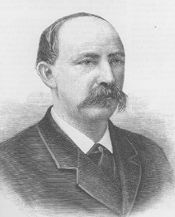Samuel Dibble
Samuel Dibble (born September 16, 1837 in Charleston , South Carolina , † September 16, 1913 in Baltimore , Maryland ) was an American politician . Between 1881 and 1882 and again from 1883 to 1891 he represented the state of South Carolina in the US House of Representatives .
Career
Samuel Dibble first attended schools in Bethel ( Connecticut ) and Charleston. In 1856 he graduated from Wofford College in Spartanburg . Between 1856 and 1858 Dibble worked as a teacher. After studying law and being admitted to the bar in 1859, he began to practice his new profession in Orangeburg .
During the Civil War , Dibble served in the Confederate Army . After the war he resumed his legal work in Orangeburg. Politically, he joined the Democratic Party . Between 1877 and 1878 he was a member of the South Carolina House of Representatives . In 1878 he was also the curator of the University of South Carolina at Columbia . He was also a member of the Orangeburg County School Board . In 1880, Dibble was a delegate to the Democratic National Convention in Cincinnati , where Winfield Scott Hancock was nominated as a presidential candidate.
After the death of Congressman Michael P. O'Connor Dibble was in the due-election in the second constituency of South Carolina as his successor in the US House of Representatives in Washington, DC selected. There he took up his new mandate on June 9, 1881. This choice was challenged by Edmund William McGregor Mackey . After Mackey's objection was granted, Dibble had to cede the mandate on May 31, 1882 to this. In the regular congressional election of 1882, Dibble was re-elected to Congress in the first district of South Carolina . There he replaced John S. Richardson on March 4, 1883 . After three re-elections he was able to complete four consecutive terms in Congress by March 3, 1891. Between 1885 and 1889 he was chairman of the State Property Committee.
In 1890, Samuel Dibble renounced another candidacy. In the following years he devoted himself to his private business, which now also includes banking. He died on September 16, 1913, his 76th birthday, near Baltimore and was buried in Orangeburg.
Web links
- Samuel Dibble in the Biographical Directory of the United States Congress (English)
- Samuel Dibble in the database of Find a Grave (English)
| personal data | |
|---|---|
| SURNAME | Dibble, Samuel |
| BRIEF DESCRIPTION | American politician |
| DATE OF BIRTH | September 16, 1837 |
| PLACE OF BIRTH | Charleston , South Carolina |
| DATE OF DEATH | September 16, 1913 |
| Place of death | near Baltimore , Maryland |

